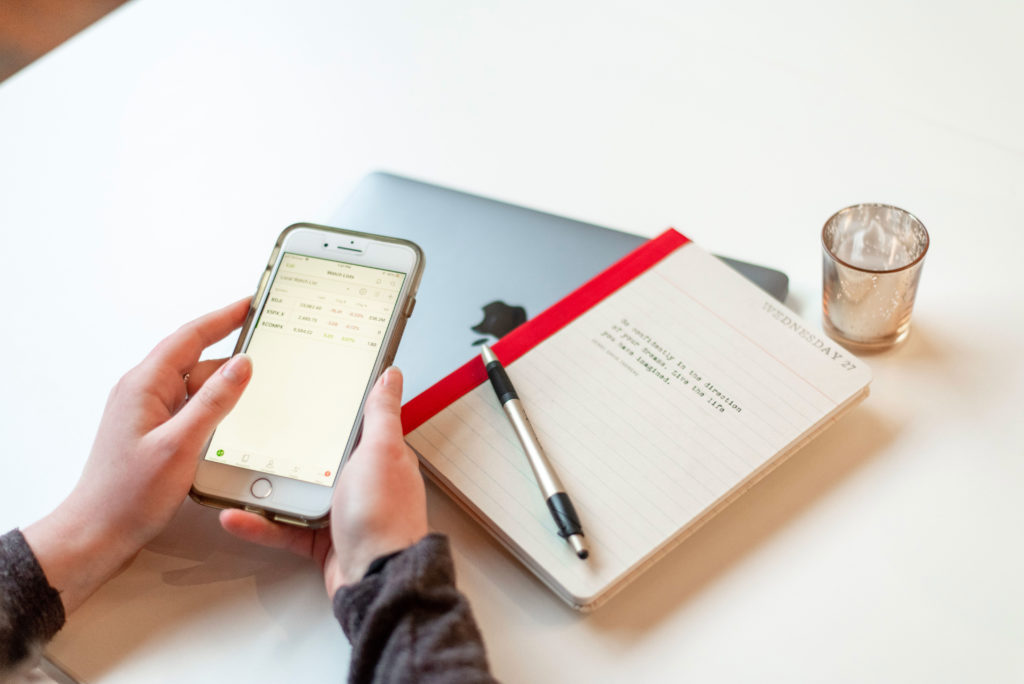It all started with a goal.
I wanted to save $100,000 by age 25. Although it was an achievement that could be considered the highlight of my 20s, for me, it was only the beginning of what has become my life’s mission.
In the two years since accomplishing that goal, I have gone on to start a multi-seven figure business; attracted a social media audience of more than 3 million; hosted the No. 1 business podcast; landed a book deal; co-founded an app; and received features in Good Morning America, the New York Times, Forbes and more—all in the name of financial feminism.
I’m no stranger to setting lofty money goals: At 9 years old I became cognizant of the idea of college—a seemingly far-off milestone that my parents described as “important” and “expensive”—and decided I needed to proactively save money for my college education. After brainstorming ways that a preteen could realistically and sustainably generate income with her parents, I used all of my birthday and lemonade stand money to buy one of those vending machines that gives you a handful of candy for a quarter, and unknowingly took the first step on my journey of entrepreneurship.
The earning potential wasn’t huge. My one vending machine would bring in a few dollars a day, but it taught me the value of consistency. My parents helped me open a bank account for my earnings, and after a few months I had not only started a humble college fund, but had also saved enough to buy a second vending machine, and then a third.

By age 14 I had acquired 15 vending machines. By 18 I had saved enough money to fully fund my first two years of college. At 20 I sold the business to another young girl—also named Tori—and simultaneously discovered what it meant to be a financial feminist.
That is, I had a resource and was able to use it to lift myself up as well as lift up another woman in my community. This ideology became the driving force behind everything I strive to do in life and business.
I believe we all have a responsibility to provide financial education to women everywhere and remind them that with financial freedom comes a responsibility to invest in the female community, advocate for women and marginalized groups, and transparently engage with one another in the pursuit of equality.
Growing up as a millennial, I and many others were taught that gender equality was settled with the 19th Amendment, which gave women the right to vote. And yet, as I graduated college and entered the corporate workforce, I couldn’t help but notice that the fields on which men and women played were far from equal.
I watched my female friends accept jobs that paid far less than they were worth. I read accounts of women being denied career opportunities due to pregnancy. I was on the receiving end of sexist, negative comments from male supervisors, and I learned that the majority of women earn 82 cents for every dollar earned by their male counterparts.
Despite everything society told me, I knew that we were far from achieving gender equality. The reality is that in today’s world, money and power go hand in hand. With the majority of wealth sitting in the hands of men, equality will never be possible until financial equality is achieved.
The need for financial feminism becomes evident; we must pursue financial literacy, competency, wellness and equality with the goal of uplifting women and marginalized groups in the name of equality.
What does it mean to pursue financial feminism?
With a financial industry that disproportionately targets marginalized groups while giving advantages to cisgendered white men, the very act of a woman pursuing financial literacy and wellness is feminist. In a 2018 study of financial capability, results showed that men, on average, responded to 3.3 out of six questions correctly, whereas women only responded to 2.7 correctly. Compared to African American participants, who responded to 2.3 correctly, white participants scored a point higher on average. For women and marginalized groups, pursuing a comprehensive understanding of your finances, breaking free of a dangerous cycle of accumulating debt, demanding to be paid what you are worth, learning to leverage credit to your advantage, investing in the stock market, planning for retirement, and engaging in transparent financial conversations with the people around you are all profoundly feminist ways to protest against a corrupt society.
I am the first to acknowledge that pursuing financial feminism, competency and freedom can feel overwhelming. This industry was not created to be easily accessible for women, and it can be challenging to know where to start. Although everyone’s personal finance journey is exactly that, there are certain steps we all can take as we pursue financial feminism and literacy.
Get familiar with your finances.
Knowledge is power, and knowledge of our own finances is especially powerful. By understanding the ins and outs of our own finances, we can better equip ourselves with the tools and strategies needed to reach our money goals.
One of my favorite tools is the “Money Date.” It’s a monthly ritual I look forward to, where I sit down with my statements from the past month, a glass of wine, and go through my transactions. I see exactly how much money I brought in, how much I spent, how much I saved, where my money went and how much progress I made toward my personal finance goals. It also helps me catch any fraudulent charges, subscriptions I no longer use or areas where I may have overspent.
I’ll be the first to admit that your first Money Date may feel like, well, a first date: a little awkward, clumsy and even intimidating. But as you incorporate this practice into your monthly routine, you’ll not only gain a comprehensive understanding of your finances, but also the confidence with which to create and maintain a plan that aligns with your financial goals.

Break free of debt.
Debt is a normal part of most people’s personal finances—according to the Consumer Credit report released by the Federal Reserve, in February 2022 Americans had $4,481 in debt on average. It’s not inherently bad. But getting stuck in a cycle of accumulating and paying debt can create long-term emotional and financial damage that hold women back from other financial priorities such as buying a home, investing in the stock market or saving for retirement.
Part of your Money Date should be dedicated to understanding your debt-to-income ratio and creating a plan to pay off debt. The debt payoff plan I find effective and accessible for many people is the “Debt Avalanche”:
1. Take time to write down all of your debts, listing them from highest interest rates to lowest, and how much the minimum payment is on each.
2. Calculate your total minimum payments to give you an idea of how much you need to pay every month to keep current.
3. Start paying extra on the credit line with the highest interest rate. Keep paying the minimums on the rest. This process works best when you focus on one bill at a time.
4. Once you’ve paid off the debt with the highest interest rate, move down the list to the next one and start paying whatever extra you can toward it each month.
You’d be amazed how fast debt starts decreasing even with just an extra $15-$20 a month, and just how confident you feel as you see yourself make progress on your debt payoff journey.
Get paid what you’re worth.
It is no secret that the gender wage gap continues to persist in 2022. This wage disparity ultimately results in women earning an average of $10,157 less than men every year, and despite the wage gap narrowing in recent years, women are not projected to achieve equal pay to men until 2059.
Although this is a systemic issue that needs to be addressed on a global scale, we can also advocate for ourselves in our workplaces to ensure we are getting paid what we are worth.
Whether you are looking to negotiate a salary for a job offer or increase your salary at a current position, the key to securing an easy “yes” is preparedness. Determine the reasons or responsibilities that warrant the pay increase, do your research into what others in your industry and with your experience are getting paid, and decide on a firm number you would like to receive. When you’re ready to have the negotiation conversation, frame your prepared research in a way that makes it easy to see why you deserve the increased pay.
I teach a highly effective negotiation script in my free salary negotiation course, which can be personalized for your specific experience and needs: “Based on my skills, education and experience, to be fairly compensated I’m looking for a range of $X–$Y. I would love to get to a number that we can collaboratively agree on.”
Leverage credit to your advantage.
People are often shocked to learn I don’t have a debit card. I simply don’t see the need for one when I can use credit cards and earn points and perks for my daily transactions.
Thanks to my credit card points, I’ve earned flight upgrades, airline lounge privileges, free stays at high-end hotels as well as cash back, just from putting my everyday purchases on my credit card. Plus, regular and responsible credit utilization is a great way to build a healthy credit history and improve your credit score so you can get better rates on a mortgage or car payment.
To be clear, the only way you can leverage credit to your advantage is to use credit responsibly. The reason I am able to charge all of my transactions to my credit card is because I know that I have the money in my account to pay off my credit card bill in full every single month. Additionally, I monitor my budget and spending closely, which helps me ensure that I don’t overspend despite using a credit card.
Don’t trust yourself to use a credit card daily but still want to earn perks and boost your credit score? Consider charging recurring payments such as a phone or utility bill onto your credit card. This will create a system of on-time, consistent payments on your credit history that will help you leverage credit to your advantage while also keeping the charges on your credit card to a minimum.
Invest in the stock market.
Investing is often considered “the final frontier” for women. In an industry that encourages you to rub the Wall Street Bull’s bronze balls for good luck, sling around finance-bro jargon, and exude masculine Wolf of Wall Street energy, navigating the stock market can be an intimidating undertaking for any woman.
In today’s society, if you are not actively investing in the stock market, chances are you will not be able to retire. As women, we must proactively learn about the stock market and invest in a way that sets us up for long-term financial success.
Use the information you collected from your Money Date to determine how much you can consistently invest each month so you can start proactively putting aside that money. Thanks to the power of compound interest, investing even just $100 each month over several years can become a significant way to increase your net worth and provide financial security during retirement.
One of my latest endeavors is co-launching an investing education platform, Treasury, that provides relevant, accessible and easy-to-understand information about investing so women everywhere can invest with confidence, grow their wealth and boldly take their place in the stock market.

Plan for retirement.
On average, women will retire with $70,000 less than men yet live seven years longer. That $70,000 can make or break someone’s financial future.
When it comes to preparing for retirement, it truly is the sooner the better. Once again, you can use your Money Date to determine how much you can contribute to a retirement fund each month or each year (that Money Date just keeps getting better and better, doesn’t it?). Personally, I choose to max out my Roth IRA contribution at the beginning of every year so it has the most time to accrue interest and I don’t have to worry about my contributions for the rest of the year.
Use your financial resources to advocate for women and marginalized groups.
Simply pursuing financial wellness for yourself is a great first step, but it’s not enough. As financial feminists, we are responsible for sharing our financial resources and using them to uplift the women and marginalized groups within our community.
Although this may sound intimidating, there are some simple ways to incorporate this practice into your daily routine.
Daily financial feminist advocacy can look like:
1. Holding employers and businesses accountable for providing appropriate support for women such as safe work environments, paid parental leave, flexibility for mothers, and equal pay between men and women.
2. Having honest conversations about pay with your friends and co-workers. This creates a spirit of pay transparency that can help the people around you determine whether they are being compensated fairly and ultimately help close the gender wage gap. This is particularly impactful coming from male allies as they are the most able to expose pay disparity among male and female co-workers.
3. Proactively supporting female-owned businesses and nonprofits so they continue to thrive and have a place within your community.
4. Holding space for and actively listening to the voices and stories of women.
Financial feminism is like putting money in a high-yield savings account: You may only make a small contribution at a time, but over time that interest accumulates and you see a huge payoff. Taking on financial security and financial feminism all at once can feel overwhelming, but daily practice will result in massive change for you and the people in your community.
Reference to any products, service, processes, hypertext links to third parties or other data by trade name, trademark, manufacturer, supplier or otherwise does not necessarily constitute or imply its endorsement, sponsorship or recommendation by SUCCESS®. Product and service information are the sole responsibility of the author.
This article originally appeared in the July/August 2022 Issue of SUCCESS magazine. Photos by ©Sarah Wolfe and Studio B Seniors.

